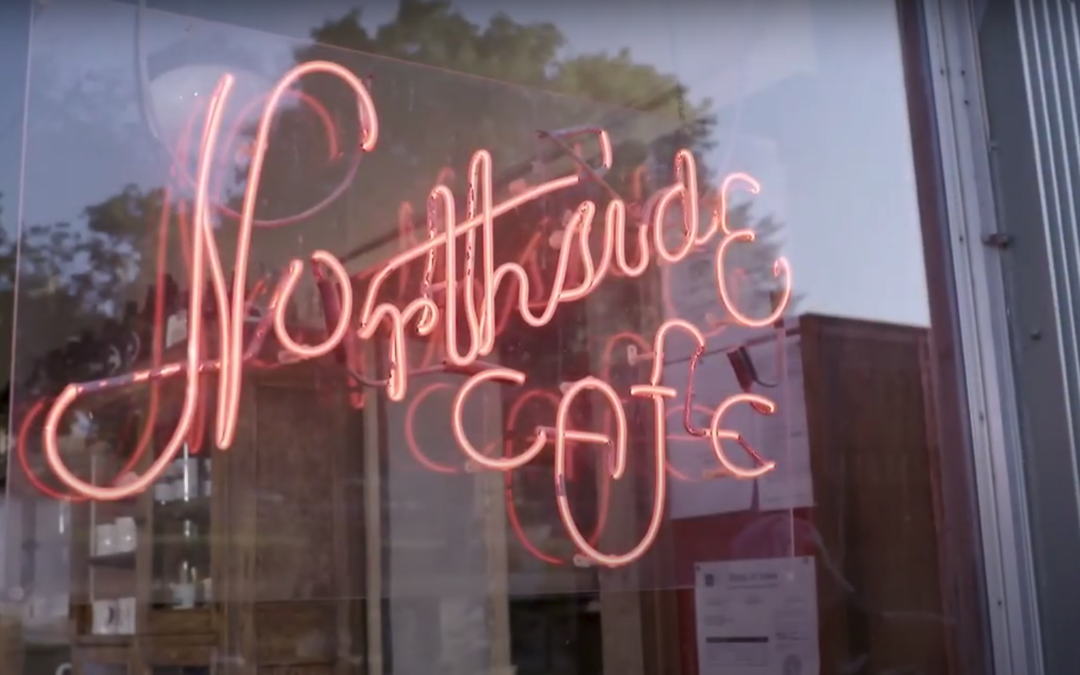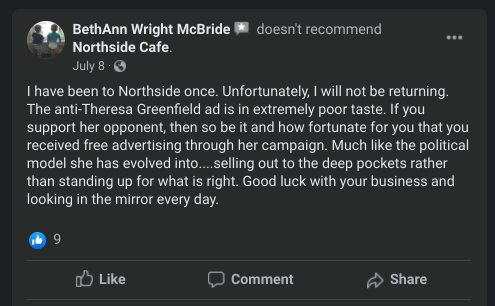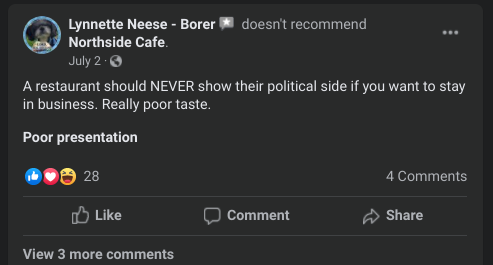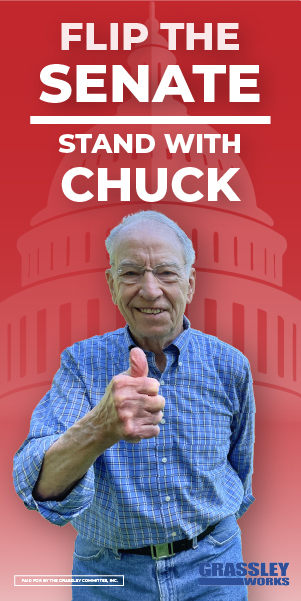The Historic Northside Cafe is right across the street from the town square in Winterset, Iowa. Iowa Field Report went down to Winterset to visit the cafe with owner Scott Valencia after hearing about some issues he and his staff are facing after deciding to appear in a political tv ad.
When Valencia was approached about doing a TV ad for the US Senate race, he was skeptical.
“The cafe, for as long as it’s been in existence, stays pretty much agnostic on everything,” said Valencia
“We have had almost every Democratic candidate and every Republican candidate come here one of the oldest restaurants in Iowa, at 144 years. So during election season, we’re pretty much a hotspot,” he touts.
But Scott says while he wasn’t interested in doing a republican or democrat ad, he had serious concerns about Theresa Greenfield (more on that later). With his family and business partners’ permission and support, he did a TV ad for the National Republican Senatorial Committee. That’s when the trouble began.
Shortly after the ad, titled “Values” began to air across the state, Scott noticed a slew of new reviews pop up on its social media profiles.
“They’ve taken my customer service scores and put them in the toilet.”
Google, Facebook, Trip Advisor, & more began popping with one-star reviews for the cafe. On the day of our interview, Scott said that hed received about ten more one-star reviews. They started with comments about the ad. Scott sought help from the social media platforms that hosted the reviews. His requests were met with varied success.
“Now originally they were posting political things saying, you know, terrible ads and you shouldn’t do that. And some of those I was able to get reversed because I said, Look, this has nothing to do with my restaurant,” he explains.
He says Tripadvisor was more helpful, but Google and Facebook claimed there was nothing they would do. After having a little success, he says the reviewers have changed tactics and don’t even provide comments.
“They just bombard me with one-star reviews. Yeah, so my phone just dinged a second ago”, pulling his phone out of his pocket, “See, bad food, bad service, one star.”
It was clear to Valencia these reviews, some coming from them as far away as California, were from people who had never visited or ate at the cafe. He was quick to acknowledge that reviews are part of any restaurant. Restaurants can die from bad reviews. Scott proudly explains that he and the staff strive to provide great food and excellent service and reach out to anyone with feedback about their visit. As a small business, he wouldn’t be around if the reviews were genuine, and is surprised that the ad hit such a chord with people that they would be willing to go out of their way to hurt his business.
Facebook Reviews:
Google Reviews:



Yelp Reviews:


Trip Advisor Review:
Sadly the story gets worse. As he leans across the corner booth, Valencia describes in detail that this goes beyond online trolls.
“We’ve had people come in, specifically asking, and then sitting here and occupying a table drinking water. They’re just taking up space to cut our sales,” he sighs. “Yeah, it’s so obvious.”
Scott tries to be the only one to answer the phone because of how aggressive and frequent harassing calls became. It got so bad his 16-year-old daughter and another woman that worked there were afraid to answer the phone.
“I mean, sometimes we get there, people would scream, just horrible things. We’ve had a couple of death threats. We had a group of people say they are going to come out here and boycott the building. And we had one guy that said he’s going to come and break our windows, we turn all that into the police. Thankfully, none of that’s come to fruition.”
Additionally, Scott shares that lunch and every dinner he can count on another tactic,
“What happens is somebody calls, and then the phone keeps ringing, and they tie up my line so legitimate orders can’t get through. So my lunchtime and to-go orders have suffered and decreased.
These tactics compound an already trying time for a small-town restaurant trying to survive amid the COVID-19 pandemic. To address the social distancing rules, only 50% of his tables are open. Thankfully, the calls have reduced in frequency since his interview.
Earlier this year, Scott approached the Greenfield campaign about worrisome details he had heard about the candidate’s record. He reached out on several occasions but never heard back. Scott was concerned about what Greenfield had done to several small businesses while she worked at the head of a company called Colby interests. When he was approached about doing an ad, he made it clear that he wasn’t interested in an ad focused on political parties. He was, however, willing to appear in one that focused on Greenfield and her record.
When asked if he regrets doing the TV spot, he immediately responds no.
“Look,” he says, “a business has to stand up for what it believes. If a business doesn’t take the time to stand up for itself and other businesses, you get what you deserve. So as a business owner, I don’t regret it.”
After the harassment began, his three daughters asked him the same question, and he told them the same thing.
It is increasingly common for American companies to take public positions on political issues. Nike recently aligned its self with former NFL quarterback Colin Kaepernick on the topic of race. Patagonia, the outdoor clothing retailer, launched its own advocacy arm, focusing on environmental issues such as climate change, battles over public lands, and fossil fuels. Both of those companies’ decisions were met with praise and adoration in the media.
Companies like Hobby Lobby and Chick-fil-a, who have found themselves on the right side of the political spectrum, have received a much cooler reception when standing for religious freedom, supporting policies deemed conservative, and more. These businesses are often the focus of visceral attacks, harassment, and boycotts. The Democratic party’s tacit (sometimes open) support for cancel culture could mean more trouble for a party struggling to attract voters increasingly concerned that political correctness has gone too far.
As we conclude our conversation, Scott reflects on the situation. He expresses his disappointment with how some people have reacted. That they have tried to mischaracterize him and clarifies that he has worked in a business setting not dissimilar from what Greenfield has. He knows that business can be challenging and sometimes unpleasant, but Greenfield’s actions are unacceptable.
“I don’t hate her. I don’t have an issue with her for doing business. I have an issue with her for doing bad business,” he says in a matter of fact tone. “The deal didn’t go through. They kicked these people out, the methods they used to kick these people out were not aboveboard. And now, she… she won’t face it.” he continued. “So if you’re going to do that, when you’re in the private sector, what are you gonna do when you’re in power in government?” He asked.





